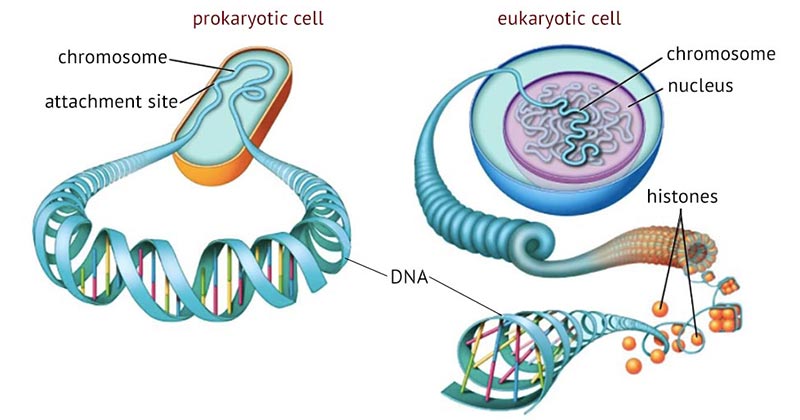What is the difference between prokaryotic and eukaryotic chromosomes?
A chromosome is a very vital cell organelle. Chromosomes are responsible for hereditary and variation since they are the carrier of genes. Prokaryotes and eukaryotes have a different structure of chromosomes.
The core difference between prokaryotic and eukaryotic chromosomes is that prokaryotic chromosomes are short and circular molecules while eukaryotic chromosomes are long and linear molecules.

What are Prokaryotic Chromosomes?
Prokaryotic chromosomes are the carrier of genetic materials for prokaryotes. They contain a total DNA pool with plasmid DNA. Each prokaryote cell has a single chromosome which is a covalently closed circular molecule.
The DNA molecule is not membrane-bound and it occurs in the cytoplasm. The nucleoid association helps the chromosome to form a loop structure for packing.
What You Need to Know about Prokaryotic Chromosomes
- Chromosomal DNA is a circular protein structure
- Chromosomal DNA is present in the cytoplasm
- Has no definite morphological structure of DNA replication
- The basic protein histones are absent
- The chromosome DNA is not complex with proteins
- They are primarily haploid
What are Eukaryotic Chromosomes?
Eukaryotic chromosomes are genetic material for eukaryotes. The chromosomes are membrane-bound and it results in a nucleus organelle.
Each eukaryotic cell contains 10-50 chromosomes. For instance, a human genome is known to contain 3 billion pairs of chromosomes.
The centromere is the center for each chromosome and the end of the chromosomes is known as telomeres. The main protein associate for DNA dense packaging is Histone.
What You Need to Know about Eukaryotic Chromosomes
- They are primarily diploid
- The chromosome DNA is complex with proteins
- Histone is present in the chromosomal DNA
- Chromosome DNA is confined within the nucleus
- The chromosome DNA is a linear polymer
- During mitosis, DNA replication occurs during S phase
Comparison Chart: Prokaryotic Chromosomes vs Eukaryotic Chromosomes
| Basic Terms | Prokaryotic Chromosomes | Eukaryotic Chromosomes |
| Meaning | Refer to the double-stranded circular DNA in prokaryotes | Refer to the double-stranded long DNA materials in eukaryotes |
| Number | Contain single chromosomes | Contain numerous chromosomes |
| Occurrence | Occur in the nucleoid | Occur in the nucleus |
| Homologous Chromosomes | No homologous chromosomes | Have a pair of homologous chromosomes |
| Attachment to the Cytoplasm | Get attached to the cytoplasm from inside | Have no contact with the cytoplasm |
| General Structure | Tend to be short and circular molecules | Tend to belong and linear DNA molecules |
| Telomeres/Centromeres | Absent | Present |
| Association with Proteins | Only with nucleoid-associated proteins | Tend to associate with histone |
| DNA Replication | Occur at the beginning of cell division | Occur during the S phase of the cell cycle |
| Origin of Replication | Has a single origin of replication per chromosome | Has several origins of replication per chromosome |
| Gene Structure | Genes tend to be organized into operons | Genes are regulated as individual structures |
| Number of Proteins | Tend to be encoded with few proteins | Tend to be encoded with a large number of proteins |
| Genetic Recombination | Tend to achieve genetic recombination through horizontal gene transfer | Tend to achieve genetic recombination through meiosis and fusion of gametes. |
| Negative Charge | Tend to be nullified with a magnesium ion | Tend to be nullified with histone proteins |
| Nature | Haploid | Diploid |
Core Differences between Eukaryotic and Prokaryotic Chromosomes In Point Form
- Prokaryotic chromosomes are found in the cytoplasm while eukaryotic chromosomes are found in the nucleus
- Prokaryotic chromosomes are short and circular DNA molecules while eukaryotic chromosomes are long and linear DNA molecules
- Prokaryotic chromosomes have single chromosomes plus plasmid while eukaryotic chromosomes are several
- Prokaryotic chromosomes are not complex with histones while eukaryotic chromosomes are complex with histones.
- Prokaryotic chromosomes are primarily haploid while eukaryotic chromosomes are primarily diploid
- Eukaryotic chromosome DNA replication occurs during S phase of the cell cycle while prokaryotic chromosome DNA replication occurs at the beginning of cell division
- The negative charge of eukaryotic chromosomes are nullified by histone while for prokaryotic chromosomes are nullified by a magnesium ion
- Eukaryotic chromosomes are coded for a large number of proteins while prokaryotic chromosomes are coded for few proteins
- Eukaryotic chromosomes are enclosed in the nucleus while prokaryotic chromosomes occupy freely the center of the cell
- Eukaryotic chromosomes have no direct contact with cytoplasm while prokaryotic chromosomes have direct contact with cytoplasm from inside
- Prokaryotic chromosomes have single-origin while eukaryotic chromosomes have several origins
- Eukaryotic chromosomes have both telomere and centromere while prokaryotic chromosomes tend to lack
- Eukaryotic chromosomes have homologous chromosomes while prokaryotic chromosomes do not have
- Prokaryotic chromosomes have organized gene structure into operons while eukaryotic chromosomes have genes that are regulated by individual structures
- Prokaryotic chromosomes are present in prokaryotes while eukaryotic chromosomes are present in eukaryotes
Similarities between Prokaryotic and Eukaryotic Chromosomes
- Both chromosomes contain DNA materials
- Both have a similar chemical composition and structural organization of DNA
- Both are facilitated by translation and transcription
- Both negative charges are nullified
- Both undergo DNA methylation for the structural regulation of gene expression.
You May Also Like:
- Difference between Prokaryotic and Eukaryotic Translation
- Difference between Prokaryotic and Eukaryotic DNA
- Difference between Prokaryotic and Eukaryotic Transcription
- Difference between Prokaryotic and Eukaryotic Cells
Comparison Video
Summary
The main difference between prokaryotic and eukaryotic chromosomes is that prokaryotic chromosomes are haploid while eukaryotic chromosomes are diploid. But both chromosomes have the same genetic composition.